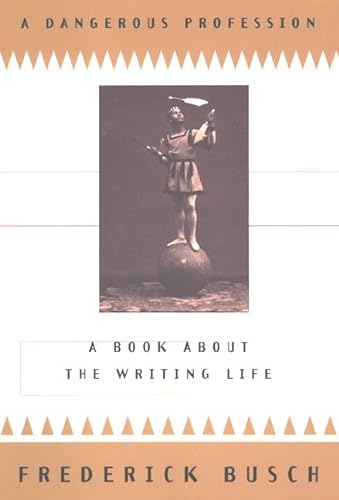Synopsis
A distinguished American novelist and critic explores the fundamental truths revealed in the fictional works of some of the world's finest literary figures, including Melville, Dickens, and Hemingway, in a collection of incisive essays on the significance of literature. 17,500 first printing.
Reviews
Thought-provoking, honest and carefully considered, this reminiscence by novelist, critic and teacher Busch (Girls; Closing Arguments) will enhance any writer'sAor reader'sAreference library. The 16 chapters examine both quality fiction (Dickens, Melville, Thoreau, Hemingway, Graham Greene, John O'Hara, etc.) and Busch's writing life. Although Busch's reflections about other writers are spot on ("As ever, Dickens writes of memory; as ever, he seeks to state a long grudge or wound and then forgive or heal it; as ever, he cannot quite succeed"), what really galvanizes the reader are Busch's observations about writing as a career and his career in particular. The most rewarding essay here ("The Floating Christmas Tree") is a near flawless retrospective of his marriage, his early career and his sense of promise ("It was a most excellent Christmas because we were what we had dreamed to beAin love and undefeated in New York"). In a similar vein is his almost penitential description of the writer's wife: "Writers' wives are those women who not only receive the hourly report of shifts in the weather of the soul; they are the women to whom vows are made with as much frequency as to the wives of gamblers, alcoholics, drug addicts, and politicians." Busch captures the struggle to create worthwhile fiction while also earning a living by doing so: "money is a letter from the world to an author about his work." Think of a more cerebral version of Anne Lamott's Bird by Bird and you'll have some notion of this valuable hybrid, which combines heartfelt memoir with an ardent love of literature.
Copyright 1998 Reed Business Information, Inc.
A prolific author's animated ruminations on the risks and rewards of writing. Busch (Closing Arguments, 1991, etc.) is the author of 21 books of primarily fiction. Writing is his calling; he has no choice but to engage in what he sadly observes is a self-indulgent and often ruinous career. But the very fact that ``it costs too much to write,'' Busch argues, forces the author to a higher plane of his craft. As he illustrates in these essays on his own career and those of others, salvation from this dangerous profession lies in surrendering one's passions to developing fictional characters and to pleasing someone other than oneselfthe reader. The 16 essays offered here originally appeared primarily in literary or book reviews. They are divided into two parts; one devoted to essays that stem from Busch's writing life, the other to the writings of others. Busch writes about his personal experience as a writer at various stages of his career, about writers, friends, and family who have influenced his work. The opening essay, ``My Father's War,'' reveals memoir-writing at its best and demonstrates, not in argument, but in style what Busch is getting at in these essays. While unified by Busch's passionate approach, this eclectic collection ranges from reflections on the author's Brooklyn-based boyhood and early career in New York to a hilarious but serious diatribe on things ``bad.'' Among the ``bad'' are the postmodern critics who ``do not love anything except the control they exercise in alleging the artist's uncontrol.'' Busch's essays on other writers include the famous (Melville, Hemingway, and Dickens) and the underappreciated (Leslie Epstein, John O'Hara, and Terrence des Pres). By conveying with passion and insight why a literary work moves him, he excites the reader to read or reread books that have long gone stale in our imaginations. Writing and reading are reunited by an author who, in these essays, shows himself to be a sharp reader, too. -- Copyright ©1998, Kirkus Associates, LP. All rights reserved.
Few literary aficionados are better qualified than Busch to write about the writing life. Busch knows fiction inside and out, both as a perceptive reader and as a versatile writer, and he forges a powerful philosophy of literature over the course of 16 vibrant essays. He begins with a tribute to his father, who flabbergasted his son by telling him that what a writer needs is energy and an ear for dialogue. Busch is blessed with both, but they would mean nothing without his sense of mission. He writes "for love," he declares, and "because of a compulsive need, out of a requirement I cannot shake: that I justify my time on earth by telling stories." He rails against the diminishment of emotion in the more academic of contemporary fiction and chronicles the trials and deprivations of a writer's life. His paean to a writer's wife is uproarious, and his robust essay "Bad" is as entertaining as it is illuminating. Busch also writes insightfully about Melville, Dickens, Reynolds Price, Graham Greene, and the superb yet underrated Leslie Epstein, proving that, yes, fiction matters. Donna Seaman
Busch loves books, a fact that is evident almost immediately in this collection of essays. As a distinguished literary critic and a novelist whose works include Girls (LJ 2/1/97) and The Children in the Woods (LJ 11/1/93), he has made reading and writing the center of his life. Some of these essays are intensely personal, telling about himself and his father, while others focus on such writers as Melville, Hemingway, Dickens, and Kafka. The essays emphasize the connection of literature to life and the moral direction literature provides. Busch ignores the post-structuralists in his criticism, instead approaching the classics with near reverence and encouraging readers to look at them again. This departure from current critical theory is refreshing. Busch's writing, full of energy and passion, provides a positive model for those who aspire to the writing life. Recommended for public and academic libraries.ANancy R. Ives, SUNY at Geneseo
Copyright 1998 Reed Business Information, Inc.
"About this title" may belong to another edition of this title.

